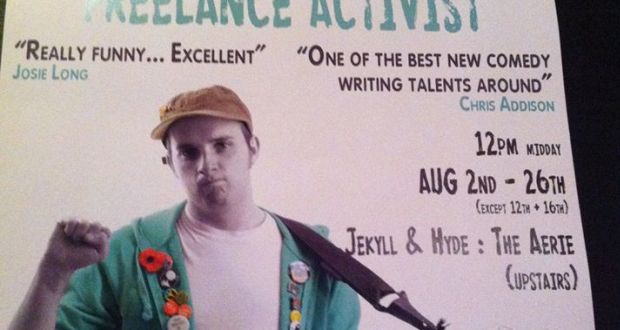Surveying the comedy scene

Like any great storyteller – and that’s what I am – I like to start with a bang; something bold and exciting to really capture the reader’s attention.
So, these people did a survey.
It doesn’t sound like much, and to be fair, it isn’t much, but the results of said survey were interesting to anyone slogging away at comedy, trying to make end’s meat (not a penis euphemism).
In that catchy and exciting way that only academic research does, the survey attempts to understand the business of comedy and how “the entrepreneurial strategies used by tech start-ups could be used to incubate comedy talent”. Oof, butter me excited!
The icing on the cake was a Power Point presentation on the pool of people who provided feedback. Now, I’m no Jeremy Vine, but I love a good graph.
Obviously, the most glaring error in this research is the naïve belief that comedy can be forced into a business strategy that wields results. Comedy is many things, but a pyramid scheme it is not. Unless you count daytime corporate gigs; in which you stand in a conference room being stared at by an array of lifeless drones. Chuck in a flip chart and you’ve got yourself an unsustainable business model seminar.
One of the most telling things about the research is that a whopping 54% of them had not performed a gig in six months, which makes me believe they’re less a comedian, more someone trying to justify spending forty quid on business cards at VistaPrint.
What really stood out though, were the figures behind the people who quit stand-up. The research reveals that the average length of time people dedicate to trying stand-up before quitting is two years and ten months. Who would be so stupid as to give up then, having devoted so much time and energy to it?
Hello there.
The research has certainly made me re-evaluate my decision to quit stand-up. Now, I’m not suggesting that a comeback is on the cards, namely because it’d be as underwhelming and ill-judged as a Best of the Black and White Minstrels Tour. But I do think about my reasoning, and whether I made the right choice.
It’s funny, but as much as I loved playing up to an audience – and I did – I don’t feel empty without it. The transition from a constantly gigging comedian to person who has full-use of his evenings, has been quite natural. I’m not itching to get back on stage and fire up the old material; I’m working hard to develop and improve my scriptwriting. It’s more that I miss just being silly and making people laugh. And that’s partly the reason that I know stand-up wasn’t for me.
Before I made the decision to quit, I was fed up with stand-up. I still enjoyed the actual performances; but the travel, the progression, building contacts – business-side of things – they started to strip the fun out of it. They’re an integral part of the job and I fully respect that, but it wasn’t for me. I was all about creating the ideas and getting them up in front of an audience, but I didn’t thrive on the lifestyle of a comic. And if you want to be a comic, your goal is to commit to living that lifestyle.
To me, the problem with surveys like this is the way they paint an unhealthy picture of what a career in comedy is. Sure, some people transition effortlessly from stand-up into sitcom writing, panel show hosting or even documentary making; but ultimately if you’re doing stand-up you have to be working towards doing more stand-up – going full time and accepting the travel, the industry, the people and everything that goes with it. I wasn’t, so I got out.
Anyone who claims they can find a way of monetising comedy quickly needs to be very clear on how they do that. Dapper Laughs managed to forge one hell of a career for himself – granted it was built on the ritual humiliation of women and undermining the act of rape – but it was still a career and frustratingly lucrative. The question is – is that a career worth having? He was able to transition from Twitter to the stage in a relatively short space of time, but despite his success, nothing ever suggested he was more than just competent at telling jokes.
No doubt he hand a strong handle of social media, even more so of self-promotion, but sooner or later those skills cease to be important. What matters is how you approach a lifetime of comedy.
Standing on stage for the fourteenth gig that week, bringing character and gusto to a routine you’re no longer in love with while your new routine about pencil sharpeners waits in the wings like an orphan at Christmas; paying out for an Edinburgh show that eats up more of your time and resources, dealing with endless payment disputes with venues and promoters – this is all part of the package and you need to be ready for it. No survey can prepare you for that.
If you’re going to try stand-up then respect the form. I respect it enough to stay out of it.



































